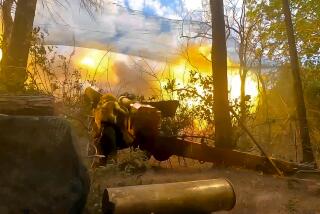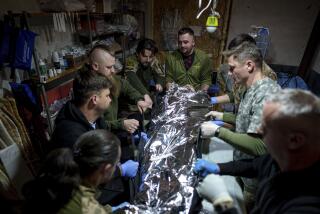Chechnya Plan May Backfire on Yeltsin
- Share via
SHALI, Russia — This muddy spot in Chechnya, with a population of 45,000, makes a presumptuous claim to be the world’s largest village. For seven months at least, it was big enough for a mayor and a police chief who took opposite sides in the war.
Until a week ago.
Then, inside a menacing ring of Russian artillery, the mayor carried out an order from Moscow to disband the police force. The 17 officers, loyal to Chechen separatist leader Dzhokar M. Dudayev, left their headquarters in a former Soviet army recruiting center, surrendered some guns and drifted away.
Bloodlessly in some places, brutally in others, a campaign aimed at saving Boris N. Yeltsin’s Russian presidency is ousting separatist guerrillas from footholds they had regained last summer in the lowlands of their southern Russian republic.
The spring offensive is a gamble for Yeltsin, who started the war in December 1994 and has pledged to end it before the June 16 presidential election.
According to villagers, officials, combatants and international observers in six Chechen localities, the Russian leader is pushing the conflict to a new, uncertain stage that could backfire on him.
“The Russians tell us they are creating a ‘peace zone’ here, but it looks more like a glass house that could shatter at any moment,” said Salman Mirzayev, a former deputy mayor of Shali. “The guerrillas are leaving, but their capacity to fight has not really diminished.”
Yeltsin’s rush to stop the war, which has claimed more than 20,000 lives, seems only to have intensified it.
His puppet Chechen ruler, Doku Zavgayev, has prodded at least 170 of Chechnya’s 350 mayors to sign a standard “protocol on peace and accord” with the Russian military, pledging to rid their settlements of “illegal armed formations.”
To get the signatures, Russian troops have encircled one settlement after another, set deadlines for the hand-over of unregistered weapons and pounded the reluctant with artillery.
*
They have obliterated parts of three Chechen towns--Novogroznensky, Sernovodsk and Samashki--over the past month, killing scores of civilians and driving thousands from their homes.
Striking back, 700 guerrillas occupied Grozny, the Russian-held Chechen capital, for three days this month, killing 91 government soldiers. Dudayev described the raid as training for new attacks inside Russia itself--the kind that would most threaten Yeltsin’s reelection.
As snow melts and skies clear in the Caucasus Mountains, stepped-up Russian air and artillery strikes have set people fleeing along muddy roads from burning settlements. Village elders wearing tall wool hats assemble outside mosques for urgent debates on how to get both sides to keep the war away.
Villagers in Katr-Yurt were stunned by a Russian general’s arbitrary demand that they surrender 100 automatic rifles and 10 Russian war prisoners within 24 hours. Claiming to have neither arms nor POWs, Mayor Ali Bashayev could gain nothing more than an extended deadline.
“The village has not slept,” he said, clueless about what to do next. “We expect a bombardment any day.”
Zavgayev hails the three-way peace protocols being signed by mayors, Russian generals and his administration as a kind of “people’s diplomacy” in which Chechen civilians prove more effective than the army in pacifying their villages.
But the protocols, which Yeltsin hopes to show as an achievement, are flawed by one-sidedness.
Unlike a July cease-fire accord that broke down in the fall, the separatists are not a formal party to them. And the Russians’ obligation to withhold fire from a village is null and void if armed separatists return.
Worse, the pressure on mayors to sign has revived a Chechen trick dating to the Stalin era: Instead of actually disarming people, village elders go door to door collecting money to buy the weapons that the Russian army demands. The guns, according to elders in three villages, are bought on the black market, most of them coming indirectly from the Russian army.
*
Despite their weaknesses, the protocols are a setback for the separatists, who had gained the right under the July accord to come down from mountain hide-outs and help form local police forces.
Nominally under Moscow’s control, the police in many villages offered logistics support to separatist fighters still in the field.
“Now people are asking them to leave,” said a European observer in Grozny. “If this goes on, the guerrillas will have few strongholds. If they attack the villages, people will turn against them. They’re in a difficult situation.”
More than a year after being driven from Grozny by Russian bombs, Dudayev’s force lacks the armor, antiaircraft guns and field hospitals to regain much ground.
But it still has a few thousand well-trained guerrillas to resist a brutal adversary that is losing the will to fight.
The Kremlin is building a 2,500-member Chechen militia to defend the puppet regime so that Yeltsin can withdraw most Russian troops. But fighting in Grozny this month revealed serious tensions between the two forces that could prolong the Russian presence.
Chechen militia fighters coming to the city’s defense and commuting to Grozny from homes outside the city said they were turned back at roadblocks by Russian soldiers.
At least 36 militia fighters vanished during the battle, 10 were arrested, and two were shot dead by Russian fire, according to the militia’s chief of staff.
Officers on each side have accused the other of aiding the guerrillas.
Abdul Bugayev, Zavgayev’s top deputy, this week accused Russian troops of looting Grozny hospitals and food warehouses during the fighting.
He also called the Russian assault on Samashki illegal, saying it could wreck the peace protocols and nourish the guerrilla ranks.
“The Russian troops to us are a stone tied to the neck of a drowning man, but to Dudayev they are a lifesaver,” said Ruslan Martagov, another Zavgayev aide, voicing a growing belief by the puppets that they can do better without their strings.
Here in Shali, Mayor Musa Dokayev says that he too wants the Russian troops out, as does his nemesis, the ousted pro-Dudayev police commander Aslambek Abdulhadzhiyev.
What separates the two men is the issue that started the war--Dudayev’s demand for independence.
*
At a farewell rally Monday beside a World War II tank that stands in the village square, a Dudayev spokesman declared the independence fight will continue and that the guerrillas, while withdrawing to spare Shali from threatened harm, would return to defend the place if necessary.
The Russians collected 60 automatic rifles, 12 grenade launchers and 30 land mines here this week, but the mayor said they will keep demanding more weapons.
“Anyone here who tells you he disarmed is lying,” said Isa Akhmadov, a construction executive and Dudayev follower who admits keeping a pistol and a grenade launcher in his home.
Mirzayev, the former deputy mayor who helped persuade the guerrillas to withdraw from Shali, warned that the protocol will break down unless Moscow soon starts withdrawing its troops and reopens peace talks with Dudayev.
“This is only the first stone in the foundation,” he said. “We have to try to keep the guns silent as long as possible, to gain time. . . . But if Russian troops cannot keep Dudayev’s men out of Grozny, how can they expect civilians to keep them out of Shali?”
More to Read
Sign up for Essential California
The most important California stories and recommendations in your inbox every morning.
You may occasionally receive promotional content from the Los Angeles Times.













